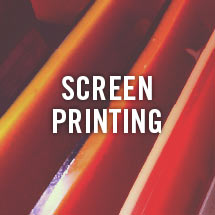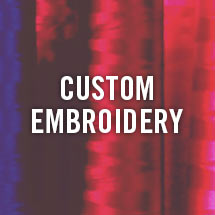When designing a custom T-shirt, there are lots of choices to make. Color, design and style are all important elements, but one of the biggest decisions is choosing the right T-shirt material. Different materials offer different benefits based on your budget, priorities and audience.
Because every project is different, there’s no such thing as one-size fits all when it comes to choosing the perfect material. Here are our top tips for deciding which T-shirt material is right for your project.
100% Cotton
Tried and true, cotton is one of the most popular T-shirt materials, and with good reason. This soft, comfortable material can be printed with just about any kind of ink or design.

HOW IT’S MADE: To create cotton fabric, cotton fibers are harvested from plants and cleaned to remove dirt and other impurities. Next, these fibers are spun into yarn and then woven or knitted into fabric.
The natural structure of cotton fabric makes it soft, breathable and stretchy. It is also considered a more hypoallergenic T-shirt material because synthetic chemicals are not used in its production. The soft, non-irritating nature of the fabric makes it a great choice for more sensitive skin. For the most sensitive skin, consider choosing organic cotton.
Cotton fabric, while soft and smooth, isn’t quite as light as other fabrics. It also doesn’t dry quickly. Cotton material is best for shirts that aren’t specifically meant to be worn outside or while exercising, such as shirts for a 5K run. It’s also more prone to shrinking and wrinkling than polyester.
Cotton T-shirts are relatively inexpensive to produce, which makes this material a great option for large-scale or budget-conscious projects. It is, however, typically more expensive than polyester options.
Cotton might be your perfect fit if…
- You’re creating a large number of T-shirts for an event or conference.
- Your target audience is likely to have sensitive skin.
- You’re producing T-shirts for a charitable cause and want to keep costs low.
100% Polyester
If you’re creating shirts for people on the move, polyester might be your best bet. This T-shirt material is more durable than cotton, which makes it less likely to shrink or stretch. It’s also more light weight.

HOW IT’S MADE: Polyester fabric is a modern miracle of science and involves a process called polymerization. Created using petroleum-based products, ethylene glycol is combined with terephthalic acid to create polyethylene terephthalate (or PET).
Polyester fabric dries quickly, which is why it’s often called “moisture wicking.” It’s also more resistant to odors and stains than cotton. If your audience is going to be out in the hot sun, spending time near the water or working up a sweat, they may be more comfortable in a polyester T-shirt.
Polyester might be your perfect fit if…
- You’re creating shirts for a 5K race.
- You’re printing new jerseys for your softball team.
- You’re ordering work uniform shirts for your landscape business.
Cotton/Polyester Blend
Want to meet in the middle when it comes to the features of your fabric? A cotton-polyester blend offers some of the benefits (and drawbacks) of both cotton and polyester alone.

HOW IT’S MADE: Blends are created with various ratios of cotton and polyester fibers depending on the desired characteristics for a given fabric. These fibers are combined through a spinning process to create a variety of blends.
The price of a cotton/polyester blend shirt is somewhere in-between the two options. The look, feel and durability of your T-shirt will depend on the percentage of each material that makes up your blend.
Some blended fabrics also have rayon added to the mix. Many people call this combination of cotton, polyester and rayon “tri-blend” material. The versatility of blended fabrics makes them another popular choice for all kinds of T-shirts.
Cotton/Polyester Blend might be your perfect fit if…
- You’re creating shirts for a kids’ camp or school event.
- You’re designing matching shirts for a bachelorette weekend trip.
- You’re ordering work uniform shirts for an office setting.
What’s the Best T-Shirt Material for Embroidery?
When embroidering a T-shirt, you need a stable, structured surface to keep the design looking clean. For that reason, natural fibers, such as cotton, are the best choice for an embroidered shirt. The strong fibers are the perfect canvas for the delicate stitches that embroidery requires. While you can use polyester shirts as well, the material’s stretchiness makes it more difficult and might require the use of specific needles and other equipment.
What’s the Best T-Shirt Material for Dye Sublimation?
When using dye sublimation to print custom T-shirts, the heated process causes a reaction which bonds the dye itself to the polyester fibers. For that reason, you can’t use natural fibers for this type of printing – it must be polyester. This reaction between the polyester and dye creates a design with vibrant, intense colors that don’t fade easily.
What’s the Best T-Shirt Material for Screen-Printing?
When creating a screen-printed T-shirt, you need a smooth surface. Cotton fabric or another natural fiber are the best choice because they provide the right level of absorbency for a vibrant, long-lasting result. You can also screen-print fabric blends depending on the ratio of cotton to polyester used.

Custom Apparel at Full Press Apparel
Want to stay up to date with the newest and best trends in custom apparel and promotional items? Our team at Full Press Apparel can help guide you through popular items and how to incorporate them into your budget. From small projects to big orders, we’re backed by decades of experience and commitment to getting it just right. Call or send us a message today to discuss your big dreams and how we can make them happen.





